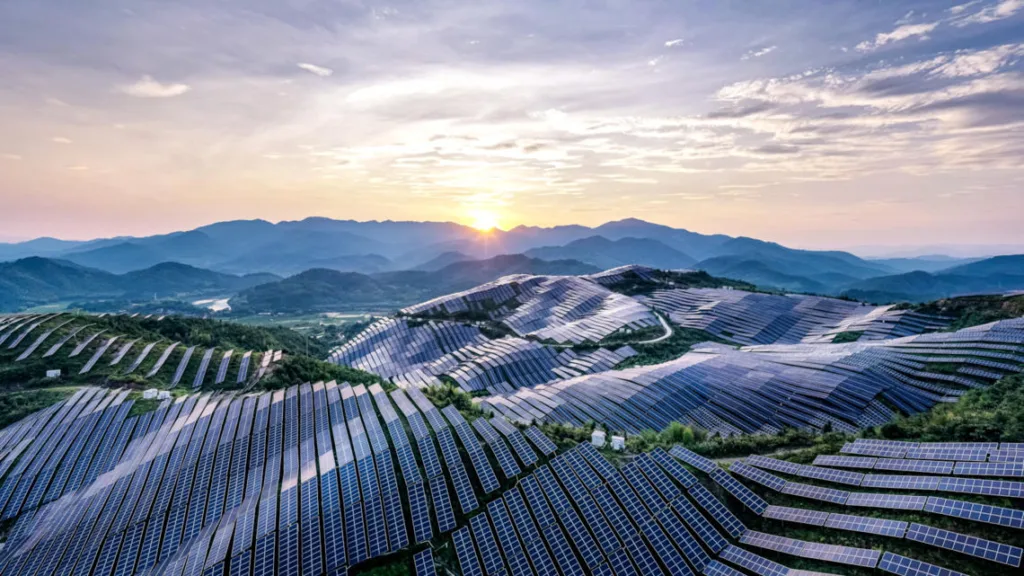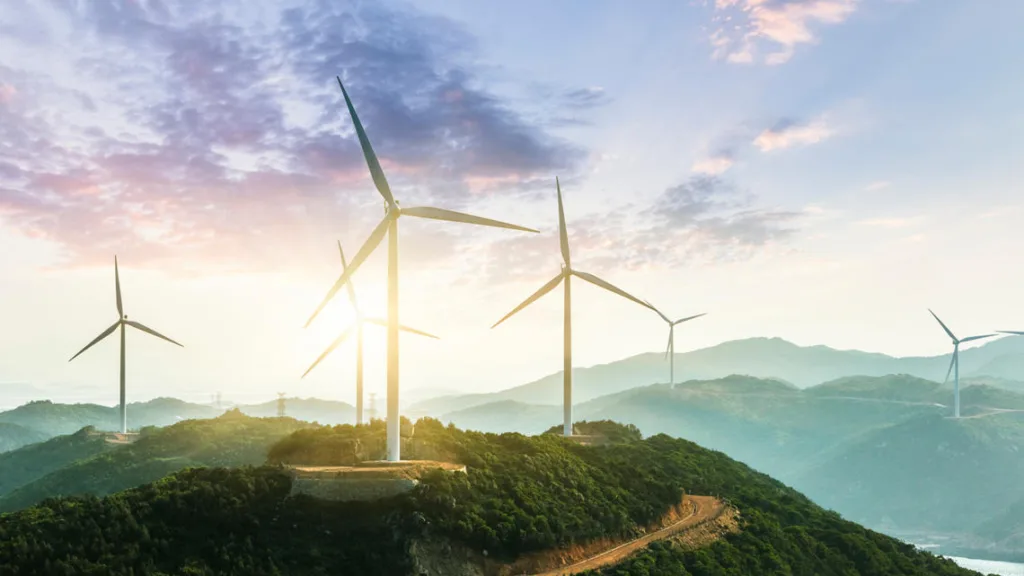Authors
Elisabeth Pipic, Manager, Just Transition, WBCSD; David Herranz, SVP Manpower Europe
As the world grapples with the urgent need to address climate change, the energy sector stands at a critical crossroads. The transition to sustainable energy isn’t just an environmental imperative—it’s a transformative shift that will reshape our workforce and society. But how can we ensure this transition is both effective and equitable? Let’s explore a vision of a truly just energy transition.
Imagine a world where half of the “green jobs” aren’t entirely new creations, but familiar roles with an eco-friendly twist. That carpenter you know? They’re now working with sustainable materials. Or maybe a packaging engineer who focuses on creating edible designs, directly addressing waste reduction while utilizing existing skills. This isn’t science fiction; it’s our immediate future.
At the World Business Council for Sustainable Development (WBCSD) and ManpowerGroup, we believe that a truly just energy transition puts people at its heart. We’re calling for a transformative approach that combines technological innovation with human-centered strategies. Our vision is a world where:
- Green jobs evolve from existing roles, reimagined with sustainability in mind.
- Data-driven insights guide our reskilling efforts, preparing workers for tomorrow’s challenges.
- Education systems rapidly adapt to equip the next generation with essential green skills.
- Businesses, governments, and educational institutions collaborate to create inclusive talent pipelines into the green economy.
- Financial markets and investors integrate employment and skill-based factors in all their investment decisions, as a risk and opportunity for value creation.
The global climate crisis is affecting lives worldwide, threatening human health, disrupting essential services, and jeopardizing livelihoods. With the energy sector accounting for over 70% of global carbon emissions, transforming how we produce and consume energy is crucial. Given its significant impact on our planet and societies, the energy sector is key to addressing some of the most pressing challenges of our time.
However, transitioning the energy sector isn’t just about reaching net-zero carbon goals or replacing fossil fuels with renewable energy. This transition must be characterized by justice and inclusivity, respecting and supporting the needs of individuals, communities, workers, suppliers, and consumers. A successful transition is therefore one built on the principle of putting people first.
Defining a Just Energy Transition
The International Labor Organization (ILO) defines a just energy transition as a shift towards a sustainable, low-carbon economy that prioritizes equity, affordability, and decent work, while addressing social and economic inequalities. Investing in reskilling or upskilling workers and communities is crucial for people to thrive in a just energy transition. Not equipping people with the necessary technical and soft skills required to meet the demands of a low-carbon system could result in 78 million job losses globally.
To achieve this just transition, we need to focus on a crucial element: green skills. These skills are the foundation upon which our sustainable future will be built.
The Importance of Green Skills in the Energy Sector
The renewable energy industry’s unprecedented growth presents numerous opportunities for resilience building in businesses and governments. According to the International Renewable Energy Agency (IRENA), worldwide employment in the renewable energy sector grew by 700,000 from 2020-2021 and is expected to reach 38 million by 2030. As the green jobs market expands, so must the workforce proficient in green skills — the set of technical knowledge, expertise, and abilities required to utilize renewable technologies and processes effectively.
However, a skills gap is emerging with the booming demand for green jobs. Research by LinkedIn shows that job postings for sustainability-focused, green skills are increasing almost twice as fast as the availability of workers with matching experience.
ManpowerGroup research finds that only 6% of the global workforce lists green skills on their profiles, indicating a severe shortage of qualified talent. ManpowerGroup also uncovers that 66% of all manufacturing roles will need to be modernized, updated, or retooled to successfully address the energy transition.
The challenge of matching diverse talent pools with the demand for green skills is even bigger within underrepresented groups. In developed economies, only 28% of green jobs are occupied by women. In emerging economies, access to green jobs is limited by inadequate training programs, lack of investment in green technologies, or insufficient policy support. Therefore, it is critical to proactively identify the skills required for sustainable energy value chains and evolve training programs to be suitable and accessible to diverse talents and profiles.
Green Skills as a Driver for Equity
Investing in green skills development ensures workers and communities can benefit and participate in the collective ambition of a net-zero carbon economy. Beyond minimizing job losses, reskilling is central to fostering community resilience and protecting livelihoods. Inclusive growth and workforce protection through reskilling help distribute the benefits of renewable energy innovation more effectively. Reskilling initiatives focusing on marginalized groups can reduce the effects of economic shocks, climate risks, and social polarization.
Educational systems must keep pace with the evolving demands of a net-zero carbon economy. Currently, 68% of global energy-related degrees are focused on fossil fuels, while only 32% focus on renewable energy. At this rate, university degrees in renewable energy will not become widely accessible until 2107. This gap underscores the urgent need for educational reform that integrates green skills into curricula, ensuring future workforces are prepared for the demands of net-zero carbon, nature-positive commitments. A collaborative effort among policymakers, educators, and industry leaders is crucial for developing comprehensive training programs with entry points for different educational levels.
Skills-First Approach to Innovation, Adaptability, and Efficiency
A skills-first approach is one that emphasizes human capital development as a driver for positive societal change. This approach allows companies to maintain a competitive edge in the evolving green energy market while centering on people’s needs amid market adaptation, regulatory shifts, and innovation. According to the Asian Development Bank, companies investing in employee training are 8 percentage points more likely to introduce new products and processes than those that do not. An appropriately skilled and innovative workforce is essential for the energy sector to achieve the necessary innovation and efficiency for a successful transition.
By prioritizing skills development, we’re investing in our collective ability to innovate and respond to the rapidly evolving challenges of climate change and energy transformation.
Data-Driven Approaches to Reskilling: A People-First Perspective
The transition to a green economy isn’t just about new technologies; it’s fundamentally about people. This insight is the basis for our people-first approach.
Leveraging data to identify skills gaps is essential for designing targeted training programs that meet the changing needs of the world of work. Data-driven insights ensure reskilling efforts align with labor market demands, address critical skill shortages, and enable us to be precise in our efforts to prepare workforces for the green economy.
This evolution in job roles necessitates a shift in talent evaluation. Traditional time-based experience metrics are becoming less relevant. Instead, the focus should be on capability-based requirements, assessing candidates’ potential and learning ability. This approach is more inclusive and better aligned with the rapid changes in the energy sector.
Looking ahead, three key trends are shaping this new future of work:
- Talent Mobility: Encouraging movement between sectors to bring fresh perspectives and cross-pollinate ideas.
- Pre-skilling: Preparing the workforce for future needs, not just current demands, ensuring people are ready for emerging roles.
- Focus on Learnability: Prioritizing curiosity and capacity to learn as predictors of success in evolving roles.
By adopting these data-driven approaches, we can ensure that the transition to a green economy is truly people-centered. It’s not just about filling job roles; it’s about empowering individuals to adapt and thrive in a changing landscape.
The green transition presents an opportunity to address both environmental challenges and workforce development. By focusing on people’s potential and adaptability, and using data to guide our efforts, we can create a more resilient and inclusive workforce ready to tackle the challenges of a sustainable future.
Remember, the shift to a green economy is as much about nurturing human potential as it is about technological advancement. By putting people first in our approach to skills development and using data to inform our strategies, we can ensure that the benefits of the green transition are shared widely, leaving no one behind.
Call to Action
Peers and thought leaders’ engagement is critical for developing comprehensive skills mappings aligned with industry needs. Partnerships between educational institutions, government bodies, and private sector organizations can ease the creation of robust training programs. These collaborations ensure reskilling initiatives are inclusive, relevant, and capable of meeting the evolving needs of a net-zero carbon economy.
WBCSD launched the Business Commission to Tackle Inequality (BCTI) to enable these critical collaborations, driving cross-sectoral commitments to equity at the executive leadership level. According to the BCTI, a just energy transition involves four key objectives:
- Mobilizing the Energy Sector: Including the social impacts of the transition on their workforce, customers, and communities in their transition plans.
- Workforce Transition and Development: Increase awareness through education and behavioral changes within energy value chains on the role of workforce reskilling and protection in implementing transition plans
- Advancing Effective Frameworks: Promoting the market adoption of sustainable energy technologies and services.
- Integrating Just Transition Performance: Deepening businesses’ operational readiness, and ultimately energy markets, to integrate just transition performance and accountability systems into energy value chains.
In partnership with ManpowerGroup, WBCSD is now applying the Just Transition Framework, placing workforce evolution at the forefront of the energy value chains. By mobilizing business leaders in the energy industry to share learnings and broaden capacity building on green skills development, the solutions designed to build a net-zero, nature-positive future will be shared broadly. Join us in designing for this future by sharing your expertise and broadening our collective knowledge in green skills development and deployment.
Contact Elisabeth Pipic, Just Transition Manager at WBCSD if you would like to know more.

Outline
Related
Content

ManpowerGroup releases its annual Working to Change the World report
19 September, 2022

Building nature positive into the energy transition
2 June, 2023

Keeping the energy transition on track: What’s next for PPAs and business leadership in renewable energy?
14 September, 2020

